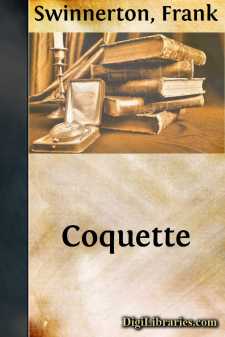Categories
- Antiques & Collectibles 13
- Architecture 36
- Art 48
- Bibles 22
- Biography & Autobiography 813
- Body, Mind & Spirit 142
- Business & Economics 28
- Children's Books 17
- Children's Fiction 14
- Computers 4
- Cooking 94
- Crafts & Hobbies 4
- Drama 346
- Education 46
- Family & Relationships 57
- Fiction 11829
- Games 19
- Gardening 17
- Health & Fitness 34
- History 1377
- House & Home 1
- Humor 147
- Juvenile Fiction 1873
- Juvenile Nonfiction 202
- Language Arts & Disciplines 88
- Law 16
- Literary Collections 686
- Literary Criticism 179
- Mathematics 13
- Medical 41
- Music 40
- Nature 179
- Non-Classifiable 1768
- Performing Arts 7
- Periodicals 1453
- Philosophy 64
- Photography 2
- Poetry 896
- Political Science 203
- Psychology 42
- Reference 154
- Religion 513
- Science 126
- Self-Help 84
- Social Science 81
- Sports & Recreation 34
- Study Aids 3
- Technology & Engineering 59
- Transportation 23
- Travel 463
- True Crime 29
Coquette
by: Frank Swinnerton
Description:
Excerpt
BOOK ONE: TOBY
i
It was Saturday night—a winter night in which the wind hummed through every draughty crevice between the windows and under the doors and down the chimneys. Outside, in the Hornsey Road, horse-omnibuses rattled by and the shops that were still open at eleven o'clock glistened with light. Up the road, at the butcher's just below the Plough public-house, a small crowd lingered, turning over scraps of meat, while the butcher himself, chanting "Lovely, lovely, lovely!" in a kind of ecstasy, plunged again into a fresh piece of meat the attractive legend, "Oh, mother, look! Three ha'pence a pound!" Just over the way, at the Supply Stores, they had begun to roll down the heavy shutter, hiding the bright windows, and leaving only a narrow doorway, through which light streamed and made rainbow colours on the pavement outside. The noise of the street was a racketting roar, hardly lower now than it had been all the evening. Sally crouched at the window of the first floor flat, looking down at the black roadway, and watching the stragglers from the Supply Stores.
In the flat above there was the sound of one who sang, vamping an accompaniment upon the piano and emphasising the simple time of his carol by a dully stamped foot upon the floor. His foot—making in soft slippers a dead "dump-dump-dump"—shook the ceiling of the Mintos' flat. They could hear his dry voice huskily roaring, "There you are, there you are, there you ain't—ain't—ain't." They had heard it a thousand times, always with the familiar stamp. It was very gay. Old Perce, as he was called, was a carver in a City restaurant. It was he who received orders from the knowing; and in return for apparent tit-bits he received acknowledgments in coin—twopence or threepence a time. Therefore, when he reached home each evening, nicely cheery and about a quarter drunk, his first act after having tea was to withdraw from his pockets a paper bag or two—such as those supplied by banks for the carriage of silver—which he would empty of greasy coppers. He piled these coppers in mounds of twelve, and counted them over several times. He then smoked his pipe, went into his front room, and played, "There you are, there you are, there you ain't—ain't—ain't." Sally did not remember ever having heard him sing anything else. He was singing it: now with customary gusto. Sally thought he must be a very rich man. Old Perce's wife, who let her practise on their piano, hinted as much. His wages were low, she said, but in a week his tips often came to three or four pounds. Three or four pounds! Whew! Sally's father only made thirty-five shillings in a week, everything included. Mrs. Perce told Sally many other things, which Sally shrewdly treasured in memory. It was well to know these things, Sally thought: any day they might be ... useful. For a girl not yet seventeen, Sally had a strangely abundant sense of possible utilities. All old Perce's relatives were licensed victuallers, she had learned; and one day he too would take a "little 'ouse" and stand behind his own bar, instead of behind the counter of a city restaurant....



